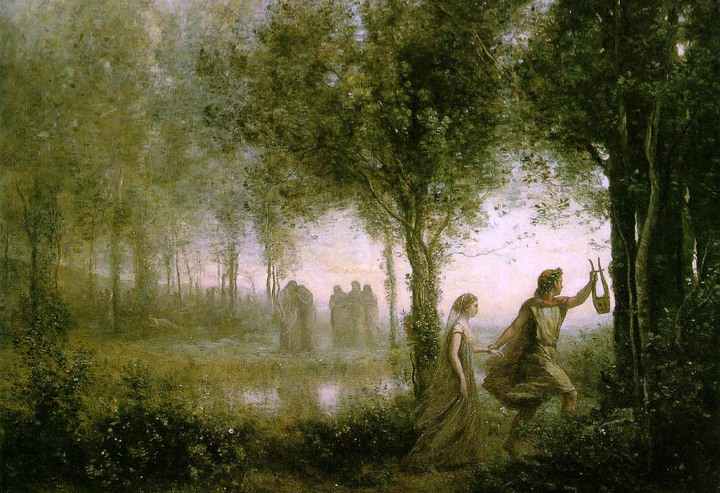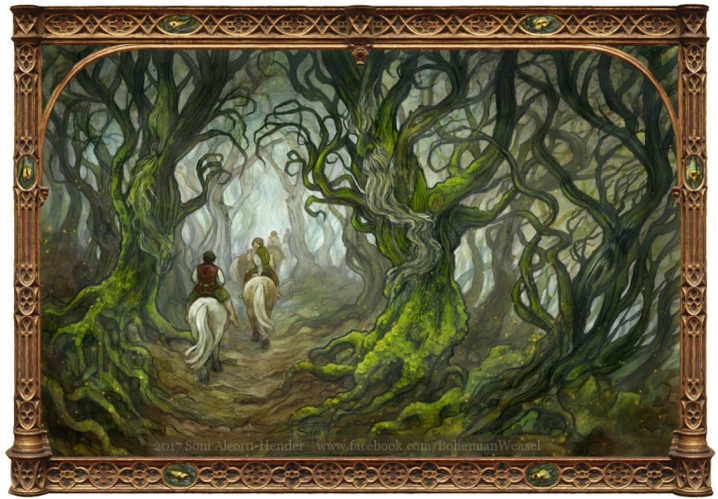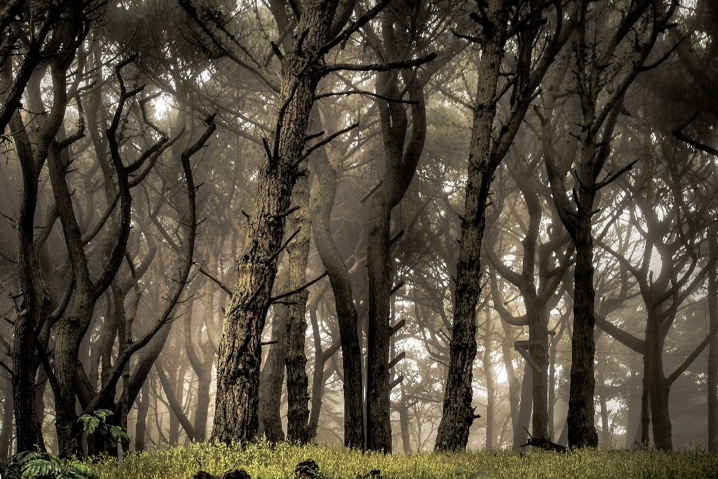[This post was written in the spring 2018 semester in response to Maj-Britt Frenze’s prompt for her course on “Tolkien’s Myths and Monsters.”]
The Prologue of Stephen Sondheim and James Lapine’s musical Into the Woods ends with a dramatic, “Into the woods and out of the woods and home before dark!” as the characters make a determined effort to convince themselves that “the woods are just trees, the trees are just wood,” and that there is nothing to be afraid of in the woods. Though the wordplay is comical, their concern is real, and not altogether unmerited. The idea that woods are a place of fantastic adventures is a common theme in both medieval and modern works.
Perhaps more interesting than the adventures that occur within the woods, however, is the way entering and exiting the woods tend to mark significant turning points in the characters’ identities. This is particularly evident in Sir Orfeo, an anonymous Middle English text, and J.R.R. Tolkien’s The Fellowship of the Ring.

In Sir Orfeo, after his wife is taken, grief-stricken Orfeo forsakes his kingdom and enters the wooded wilderness with nothing but a beggar’s cloak and his harp. He effectually leaves behind his kingly identity, retaining only his identity as a musician. The author emphasizes this shift in Orfeo’s identity with four striking comparisons between his kingly identity and his new beggarly identity (241-56):
He once had ermine worn and vair,
On bed had purple linen fair,
Now on the heather hard doth like,
In leaves is wrapped and grasses dry.
He once had castles owned and towers,
Water and wild, and woods, and flowers,
Now though it turn to frost or snow,
this king with moss his bed must strow.
He once had many a noble knight
Before him kneeling, ladies bright,
Now nought to please him doth he keep;
Only wild serpents by him creep.
He that once had in plenty sweet
All dainties for his drink and meat,
Now he must grub and dig all day,
With roots his hunger to allay.
At the end of ten years, Orfeo finally sees his wife again, and, in following her party, leaves the wooded wilderness and enters “a country fair / as bright as sun in summer air” (Sir Orfeo 351-2). As he leaves the woods, Orfeo alters his beggarly identity, assuming the identity of travelling minstrel offering service to the king in order to gain entrance to the mysterious castle.
Finally, after Orfeo rescues his wife and exits the metaphorical woods of testing his steward’s loyalty, he reassumes his kingly identity, bringing his kingdom back to the joy of former days.

Another character whose identity shifts in his woodland journeys is Frodo in The Fellowship of the Ring. In chapter 4, Frodo, Sam, Merry, and Pippin begin the journey that ultimately takes Frodo to Mount Doom. When they begin their travels, leaving the Shire and entering the Old Forest, all four hobbits are relatively carefree. Merry even says triumphantly, “There! You have left the Shire, and are now outside, and on the edge of the Old Forest,” as if leaving the Shire was to be the worst part of their journey (Tolkien 124).
Shortly after entering the Old Forest, Frodo experiences the first symptoms of his identity shift. As the hobbits lose their way, we learn that “a heavy weight was settling heavily on Frodo’s heart” (Tolkien 127). It is in the Old Forest that Frodo completely adopts the identity of grim determination that follows him throughout his journey to Mount Doom.
Later in the Fellowship’s journey, Frodo has a brief chance to reassume a relatively carefree identity as the party enters the woods of Lothlórien. Though the chain of events that follow Frodo’s entrance to the Old Forest have completely altered his identity and made mirth impossible, entering Lothlórien does give Frodo a sense of hope as he takes in the purity of its woods and realizes that “on the land of Lórien there was no stain” (Tolkien 393).
Finally, the phial of the light of Eärendil’s star that Galadriel gives to Frodo as the Fellowship prepares to exit Lothlórien proves to be a beacon of light and hope for Frodo, helping to carry him through the rest of his journey.

Both the tale of Orfeo in Sir Orfeo and Frodo’s experiences in The Fellowship of the Ring can be summed up in another section of the Prologue of Into the Woods:
Into the woods
without regret,
The choice is made,
the task is set.
Into the woods,
but not forget-
ting why I’m on the journey.
Orfeo knows that his life is nothing without his queen, so he chooses to go bravely into the woods to find her, accepting the inevitable changes that he will undergo on his journey.
Frodo recognizes the severity of the task Gandalf presents to him and knows that once he chooses to set out, there can be no turning back.
As we learn from Orfeo and Frodo, a journey into the woods is often not as simple as “into the woods and out of the woods and home before dark.” A journey into the woods is not easy, and a journey into the woods will often change the journeyer. However, as the end of Into the Woods so neatly sums up:
Into the woods—you have to grope
But that’s the way you learn to cope
Into the woods to find there’s hope
Of getting through the journey.
Carolyn Bergdolt
University of Notre Dame
————-
Texts & Other Sources:
“Sir Orfeo.” Sir Gawain and the Green Knight, Pearl, Sir Orfeo. Translated by J. R. R. Tolkien. Houghton Mifflin, 1975, pp. 123-137.
Sondheim, Stephen. Lyrics to “Children Will Listen/Finale.” Genius, 2018, genius.com/Original-broadway-cast-of-into-the-woods-children-will-listen-finale-lyrics.
—. Lyrics to “Prologue: Into the Woods.” Genius, 2018, genius.com/Original-broadway-cast-of-into-the-woods-prologue-into-the-woods-lyrics.
Tolkien, J. R. R. The Fellowship of the Ring. Houghton Mifflin, 2002.
